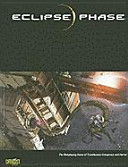RPG as Group Exercise
A roleplaying game (or RPG, for short) is part noémprovisational theater, part storytelling, and part game. A single person (the gamemaster) runs the game for a group of players that pretend to be characters in a fictitious world. The world could be a mystery game set in the 1920s that takes you adventuring around the globe, a fantasy realm inhabited by dragons and trolls and sword-wielding barbarians, or a science fiction setting with aliens and spaceships and world-crushing weaponry. The players pick a setting that they find cool and want to play in. The players then craft their own characters, providing a detailed history and personality to bring each to life. These characters have a set of statistics (numerical values) that represent skills, attributes, and other abilities. The gamemaster then explains the situation in which the characters find themselves. The players, through their characters, interact with the storyline and each other’s characters, acting out the plot. As the players roleplay through some scenarios, the gamemaster will probably ask a given player to roll some dice and the resulting numbers will determine the success or failure of a character’s attempted action. The gamemaster uses the rules of the game to interpret the dice rolls and the outcome of the character’s actions.
As a group exercise, the players control the storyline (the adventure), which evolves much like any movie or book but within the flexible plot created by the gamemaster. This gamemaster plot provides a framework and ideas for potential courses of action and outcomes, but it is simply an outline of what might happen—it is not concrete until the players become involved. If you don’t want to walk down those stairs, you don’t. If you think you can talk yourself out of a situation in place of pulling a gun, then try and make it happen. The script of any roleplaying session is written by the players, and the story, based upon the character’s actions and their responses to the events of the plot, will constantly change and evolve.
The best part is that there is no “right” or “wrong” way to play an RPG. Some games may involve more combat and dice rolling-related situations, where other games may involve more storytelling and improvised dialogue to resolve a situation. Each group of players decides for themselves the type and style of game they enjoy playing!
Notes:
Folksonomies: rpg role-playing game
Taxonomies:
/hobbies and interests/games/role playing games (0.524682)
/hobbies and interests/games/gambling (0.388375)
/science/mathematics/statistics (0.328985)
Keywords:
gamemaster (0.991253 (negative:-0.087381)), players (0.930865 (positive:0.051384)), group exercise (0.929404 (neutral:0.000000)), dice rolling-related situations (0.880843 (neutral:0.000000)), gamemaster plot (0.834821 (neutral:0.000000)), characters (0.755391 (negative:-0.139086)), sword-wielding barbarians (0.724133 (neutral:0.000000)), noémprovisational theater (0.707046 (neutral:0.000000)), fictitious world (0.700343 (negative:-0.362877)), single person (0.696766 (neutral:0.000000)), world-crushing weaponry (0.691375 (negative:-0.238861)), science fiction (0.683776 (negative:-0.238861)), dice rolls (0.682655 (negative:-0.273444)), mystery game (0.681601 (positive:0.304348)), fantasy realm (0.678439 (neutral:0.000000)), represent skills (0.672419 (positive:0.311664)), numerical values (0.664593 (neutral:0.000000)), potential courses (0.656172 (neutral:0.000000)), flexible plot (0.642910 (positive:0.330316)), roleplaying session (0.637210 (negative:-0.518574)), RPG (0.551374 (neutral:0.000000)), character (0.537712 (negative:-0.321913)), storytelling (0.515208 (negative:-0.662509)), storyline (0.514802 (neutral:0.000000)), action (0.496940 (neutral:0.000000)), actions (0.489140 (negative:-0.321913)), games (0.482564 (negative:-0.662509)), spaceships (0.462194 (negative:-0.238861)), trolls (0.460399 (neutral:0.000000)), 1920s (0.456453 (positive:0.304348))
Concepts:
Game (0.956243): dbpedia | freebase | opencyc
Dice (0.692029): dbpedia | freebase
Fiction (0.633766): dbpedia | freebase
Character (0.623211): dbpedia | freebase
Storytelling game (0.620460): dbpedia | freebase
Play (0.602693): dbpedia | freebase | opencyc
Roleplaying (0.564821): dbpedia | opencyc
Role-playing game (0.564730): dbpedia | freebase | opencyc






